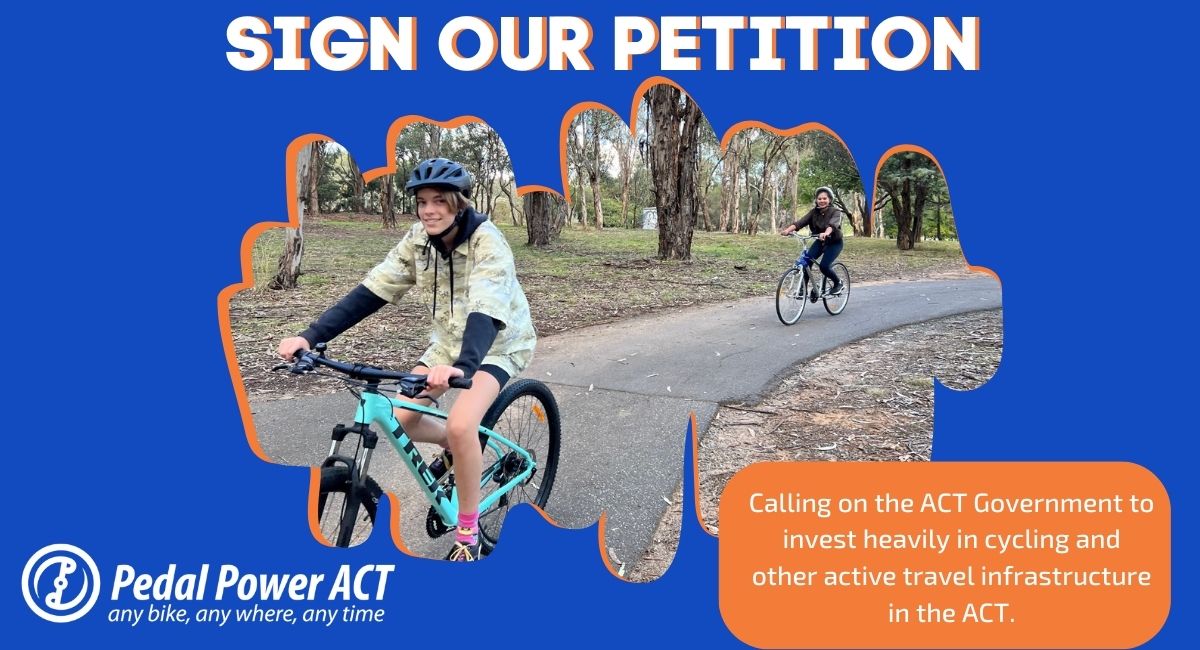As an organisation committed to creating a more sustainable and liveable city, Greater Canberra strongly believes that medium density suburbs and better active travel infrastructure go hand in hand. That’s why we’re joining with a range of ACT community organisations to support Pedal Power’s latest campaign to build out and better maintain the ACT’s cycle network. Read on for more details about what the petition entails, why Greater Canberra has signed on, and how you can add your support!
What’s the petition about?
The petition - created by ACT cycling advocacy group Pedal Power - urges the ACT Government to take immediate action to implement the Draft Active Travel Plan and secure Canberra’s position as Australia’s cycling capital. It highlights concerns regarding the need for a clear timeline for the plan’s finalisation and the lack of commitment to provide funding to match the plan’s ambitions. The petition calls for a connected, safe, and convenient cycle network to prevent Canberra from becoming a car-centric environment that is hostile to active travel.
The petition calls for a number of specific policy responses from the ACT Government, including:
- Identifying and filling in missing links in the ACT cycle network
- Constructing safe bike and active travel routes to and from schools, health facilities and town centres
- Converting on-road cycle lanes to separated cycle lanes or paths
- Setting a 90% target for the maintenance of cycle lanes, shared paths, and footpaths in ‘good’ condition
- Installing raised pedestrian crossings along principal cycle routes
- Building better bike cages and end-of-trip facilities in town and group centres.
Add your support by signing the petition here!
Why has Greater Canberra signed on?
Greater Canberra was founded on the idea that through better housing and land-use policy, we could create a more liveable, sustainable, and affordable Canberra. While the focus of our campaigning has understandably been on housing affordability, we don’t think that the benefits of a more compact and better-connected city stop there.
As was outlined in the Missing Middle Canberra open letter, how we shape our city’s design over the next decade will be a deciding factor in whether or not the ACT is able to reach its ambitious climate target of net zero by 2045. As it stands, we remain concerned that Canberra’s climate policies - like many cities in Australia - are far too reliant on electric vehicles to drive emissions reductions in the transport sector.
Vehicles with internal combustion engines will continue to make up a significant proportion of Australia’s fleet for decades. Banning well-located medium-density homes will make it harder for the ACT to reach its net zero target. Over-reliance on cars (electric or otherwise) also comes with a range of other challenges, from increasing demands on parking, more traffic congestion and accidents, and ongoing air pollution from tyre degradation.
We believe there’s a better alternative - creating a more compact, prosperous, and better connected city that’s less reliant on cars. That means allowing more homes in inner-city areas near to jobs, community and amenities, along with better public and active transport infrastructure to get people where they need to go. We also believe that these two things go hand-in-hand: investing in better active travel infrastructure helps allay many of the concerns that Canberrans may have about increasing density, while reforming zoning laws to enable more density along active travel routes is a great way to create more well-located homes.
We look forward to working together with Pedal Power - who were also a signatory of the Missing Middle Canberra open letter - to help promote practical solutions that can create a more sustainable, affordable, and well-connected Canberra.
